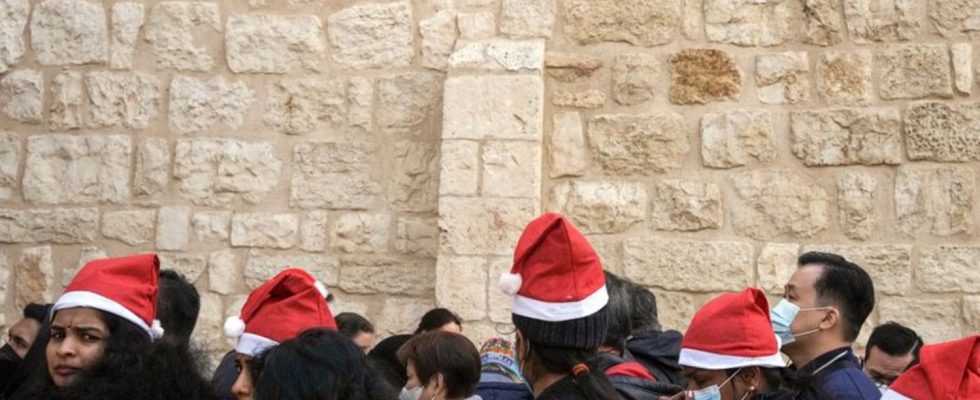The Holy Land has been rocked by the Gaza war between Israel and the Islamist Hamas since October. The Christmas spirit is hard to come by. People celebrate in small groups if they can.
Next to the altar there is a pile of stones with wooden figures around them. In the middle lies a doll wrapped in a black and white Palestinian scarf, as photos show. Members of the Evangelical Lutheran Christmas Church in Bethlehem wanted to remember the children buried under rubble in the Gaza Strip, says Pastor Munther Issak. “The idea is that Christ was born among the oppressed and those who suffer today.” The installation replaces the Christmas tree this year.
Bethlehem in the southern West Bank – believed to be the birthplace of Jesus Christ – is one of the holiest places for Christians. Usually, especially during the Christmas season, masses of tourists move through the old town and to the world-famous Church of the Nativity. But this year the Gaza war is overshadowing Christmas in the Holy Land.
No Christmas decorations
The large Christmas tree that usually stands in front of the Church of the Nativity during Advent is missing. The heads of the churches in Jerusalem had already decided in November that there should be no Christmas decorations in the Holy Land because of the war.
However, the midnight mass in Bethlehem with the Latin Patriarch of Jerusalem, Cardinal Pierbattista Pizzaballa, is scheduled to take place on the night of December 25th.
“Bethlehem is sad this year,” says Pastor Munther Issak, whose church is just a few minutes’ walk from the Church of the Nativity. “We are all sad and suffering because of what is happening in Gaza.”
The war was triggered by the worst massacre in Israel’s history, carried out by terrorists from the Islamist Hamas and other groups on October 7th in Israel near the border with the Gaza Strip. More than 1,200 people were killed. Israel then began massive air strikes and, since the end of October, a ground offensive in the area. According to the health authority controlled by the Islamist Hamas, more than 18,000 people have now been killed.
Fear of an expansion of the war
Pastor Munther Issak says that the people of Bethlehem are also afraid that the war will spread. There is also strong economic pressure because many people work in tourism. Access to the city is extremely restricted due to roadblocks set up by the Israeli army, Palestinians say. Israel conquered, among other things, the West Bank and East Jerusalem in the Six-Day War in 1967. The Palestinians claim the areas for their own state with East Jerusalem as its capital.
In the Holy Land, Christians only form a very small minority: around 1,000 Christians live in the Gaza Strip, out of a total population of around 2.2 million. In Israel, Christians make up almost two percent of the approximately 10 million citizens. In the West Bank it is around 1.5 percent of the approximately 3.2 million Palestinians.
The situation for Christians is most difficult in the embattled Gaza Strip. Every year around this time, Haitham Saba and his family of four prepared for Christmas, buying decorations, new clothes and sweets. The 29-year-old says they celebrated together in the Greek Orthodox Church in the old town of Gaza.
But this year he also had to retreat to church with his Muslim neighbors to protect himself from Israeli air strikes, he says. According to the church, the church was hit in an Israeli airstrike in October. It was said that 18 people who had sought protection were killed.
Christmas in a small circle
Four Christians were killed in the massacre in Israel on October 7th – 21 Christians have been killed in the Gaza Strip since the war began, according to Father Nicodemus Schnabel, abbot of the Dormition Abbey in Jerusalem.
Even in Jerusalem’s Old City with its small shops, the illuminated Christmas trees, Christmas decorations and the usual masses of Christmas tourists are missing. Instead, people will celebrate Christmas in a small group this year, said Schnabel. “Everything that is religious is taking place, everything that has been cut away is what is around it,” says the Benedictine monk. “It’s about an intimate Christmas where the birth of Jesus Christ is the focus.” It is not yet clear whether there will be a tree in the church at Christmas.
The Dormition Abbey with its shop, cafeteria and church is open. Church services and concerts take place. “I want people to feel that when they step over the threshold with us, such a weight is lifted,” he says. The concerts were also well attended with 200 or 300 listeners.
Like every year, the monks want to walk to Bethlehem to the Church of the Nativity on Christmas Eve. They always carry a roll with the names of people who asked for it. This year, for the first time, names of dead people are on the roll – of victims of October 7th and the war that followed, as Schnabel explains. By Christians, Muslims and Jews. At the request of relatives. The monk says: “The naming campaign gives comfort to many.”

